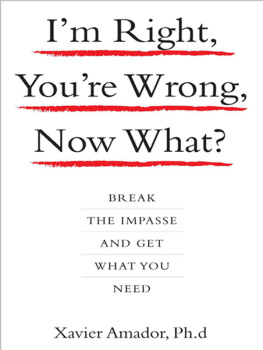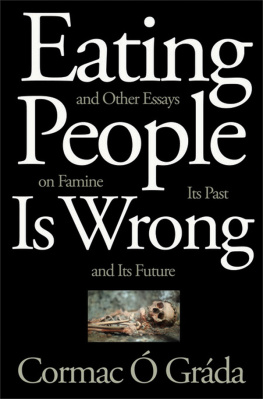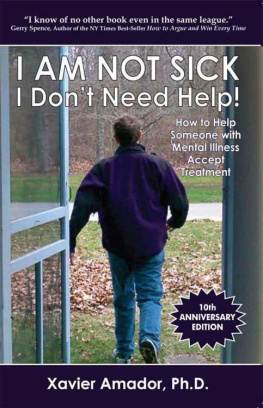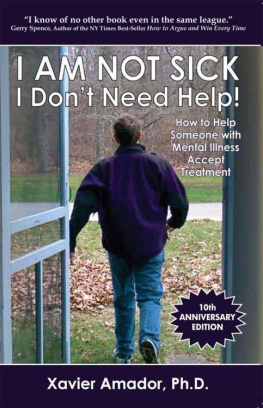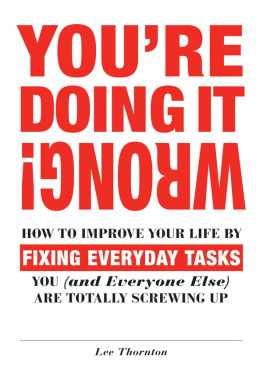Xavier Amador, Ph.D.
I failed the test.
I knew I would, because I froze when I read the first question. My vision narrowed, the classroom darkened, the pencil kept threatening to slip out of my sweaty fingers, and the test questions all turned into hieroglyphics. I knew in that horrible moment that I would fail the final statistics examor as I called it, sadistics. I was doomed and should have left the room right then. The only reason I didnt was that David, the teaching assistant who was proctoring the test, and had been my statistics tutor for two years, had faith in me, and my high grades up until then had proved him right.
I have bad news for you, David said two days later when he found me in the New York University clinic where we both saw patients. Lets go into one of the therapy rooms and talk.
I almost laughed at his choice of venues for giving me the bad news, but I didnt. Instead, I said, I know. I failed the final.
I was really surprised, he said kindly. You understood the material. What happened?
I had a panic attack. I froze.
David suggested I call Professor Cohen, explain what had happened, and ask to take the exam again that same day. He even phoned ahead and put in a good word for me, so with a glimmer of hope I made the call.
Hello, the gruff baritone voice said.
Dr. Cohen, its Xavier Amador. I believe David told you I was going to call, I said quickly, a little short of breath for some reason.
Yes, yes, he told me, but I dont know what I can do for you. Ive never allowed anyone to retake the final. Its unprecedented.
Can I tell you what happened before you make a final decision?
David already told me, the professor said impatiently, but if you insist, go ahead. I reminded him of my previous grades and told him of my little problemnow a very large onewith math anxiety. He was a psychologist, so I was hopeful my confession might elicit some sympathy. Then I delivered what I felt was my most compelling argument for being allowed to retake the exam.
If I fail your class, Ill have to pay tuition again and wait an entire year before I am awarded my Ph.D. That seems like a very high price to pay for failing this one last exam. Ive passed all the others for two years now.
Sorry, but I cant set a precedent like this. If I do it for you I will have to do it for everyone.
But Ill be delayed an entire year! I already have a job offer at Columbia University and Ill have to turn that down, I pleaded, my voice cracking.
Im not unsympathetic, but it would set a precedent and I cant do it.
But you can. Its your decision!
No, I cant.
But Im sure you can. I checked it out with
I have to go now, the professor interrupted. Im sorry. I wish you the best of luck. He had stopped listening and the call ended at an impasse. He would be submitting final grades in two weeks and my fate would be sealed unless, I thought, I could convince him I was right and he was wrong. As you will soon see, I didnt exactly convince him he was wrong, but I did persuade him to let me take the test again.
Whether the issues are big or small, we all get into these situations every day. We know were right and the other person is wrong. The problem is that the other person also knows hes right and youre the one whos too stubborn to admit it. Such impasses occur at home, at work, at school, and elsewhere. The specifics and scope of the situation may change, but the underlying dynamics do not. And what have you done up until now to make the person you were arguing with see things your way? Delivered a rational argument? Tried to make him feel guilty? Sulked? Yelled? Threatened? Has it worked? Have you gotten what you wanted? More importanthave you gotten what you actually needed?
If youve focused myopically on getting your opponent to say, Youre right, Im wrong, which is what we all think we want during the heat of battle, Id venture to guess that nine times out of ten you havent gotten what you needed and the times you have won were usually at the expense of the relationship.
Until you start to do something different and begin to focus on what you actually needgetting the person to do the thing you want him to dothose outcomes are going to remain the same.
Whats at risk may be as important as whether or not your kid drops out of college, whether or not your aging parent goes into a nursing home, or whether or not you and your partners sell your business. Or it may be one of the countless everyday impasses you reach while trying to negotiate smaller matters, such as whether or not you really did promise your wife to take the family to the beach next weekend when you had planned to play golf with your brother, or whether your health insurer will pay for the nuclear stress test your doctor recommended.
One thing all these disagreements have in commonthe one you may not even have consideredis that you have to create a positive relationship with that other person if youre ever going to get what you need. You have to turn him from an adversary youre arguing with into a partner who is working with you. It doesnt matter if that other person is your coworker, your bank manager, your child, or your spouse. It may be for five minutes or five days, or it may be for the rest of your life, but right then, at that moment, you need that other person to work with you instead of against you. And to accomplish that you have to show some genuine interest in his perspective and his needs.
In my seminars on how to break an impasse I always ask, Why would anyone want to listen to you if he felt you had not first listened to him? Quid pro quo. This important psychological principlewhich is the cornerstone of my method for breaking an impasseis far from new. More than two thousand years ago the Roman poet Publilius Syrus said, We are interested in others when they are interested in us. Psychologists who are expert in conflict resolution and marriage and family therapy have written about this fundamental principle for decades. Dale Carnegie, the author of the seventy-year-old best-seller How to Win Friends and Influence People , writes, Philosophers have been speculating on the rules of human relations for thousands of years, and out of all that speculation, there has evolved only one important precept. It is not new. It is as old as history. Zoroaster taught it to his followers in Persia twenty-five hundred years ago. Confucius preached it in China twenty-four centuries agoJesus taught it among the stony hills of Judea nineteen centuries ago. Jesus summed it up in one thoughtprobably the most important rule in the world: Do unto others as you would have others do unto you.
We are interested in others when they are interested in us.
More recently the authors of Getting to Yes, The 7 Habits of Highly Effective People, Good to Great, How to Argue and Win Every Time , and other insightful observers of human relations have all emphasized this same fundamental principle of persuasion. But despite the ancient lineage and popular dissemination of this simple and logical truth, it is too often overlooked when we are lured into an Im right, youre wrong situation and end up thrashing around like a fish caught on the end of a line, certain that if we just try hard enough (speak more loudly or repeat our position once again) we will win. Sometimes we do succeed in bending the other person to our will, but not without doing some damage.

